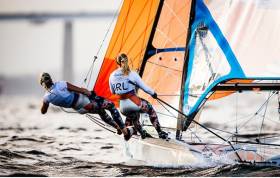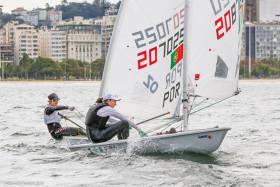Displaying items by tag: Andrea Brewster & Saskia Tidey
Both Irish Skiffs Fifth After Great Start to Olympic Regatta
Both of Ireland's Olympic skiff crews are in the top five overall after an explosive start to their Olympic regattas in Rio this afternoon. Northern Ireland's Ryan Seaton and Matt McGovern scored a second in race two today and in more good news for Team Ireland, Dun Laoghaire's Andrea Brewster and Saskia Tidey took a third in the second race of the 49erfx. See results here.
Seaton and McGovern had results of 14th and 2nd, while Brewster and Tidey finished 8th and 3rd in their races.
Finn Lynch is 29th in the Men's Laser.
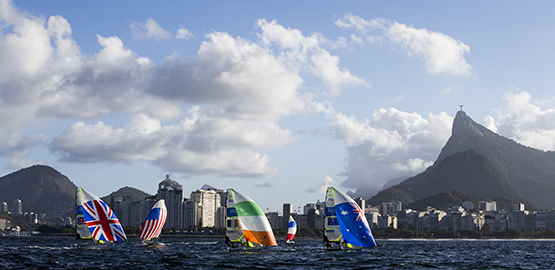 The Irish 49er skiff took a well earned second in race two. Photo: World Sailing
The Irish 49er skiff took a well earned second in race two. Photo: World Sailing
49er
Peter Burling and Blair Tuke (NZL) made the perfect start to their competition winning both opening heats in the Men's 49er. After a long wait for the wind to settle on the Pão de Açucar (Sugarloaf Mountain) race course, it was Jonas Warrer and Christian Peter Lubeck (DEN) who found themselves duelling with the New Zealanders at the front of the fleet. Warrer, the 2008 Olympic Champion, looked to have got the better of the Kiwis on the final lap and was leading down to the finish when he belatedly realised he had missed out the gate mark. The Danes reluctantly but hurriedly dropped their gennaker to resail the course correctly, leaving the way clear for an easy opening victory for Burling and Tuke. Warrer crossed in eighth, an expensive mistake that could cost him further down the line.
In the next race the Kiwis rounded the first mark in fourth and patiently worked their way to the front ahead of the Irish pair Ryan Seaton and Matthew McGovern. At the end of a day that saw some spectacular racing in moderate breezes and beautiful winter sunshine, New Zealand holds the lead, Portugal is second and Germany is third. "We're just happy to walk away from day one with two low scores,” said Burling, the four-time World Champion. While the Kiwi boatspeed was good, most of their winning came from picking their way through the gusts and the lulls on the tricky course. "We made our gain in that first race when we gybe-set on that first run. It felt like we found some good breeze and that helped us get out of the pack and up to the front.”
Their opening day wasn't the way that Nathan Outteridge and Iain Jensen (AUS) would have liked to open the defence of their Olympic title. Scores of 13,8 put the Australians in 11th overall. "We haven't lost the event, but we haven't set the world on fire,” Outteridge admitted, acknowledging they just weren't quite fast enough out of the blocks. "A lot of it is trying to get on the first tack and getting yourself up the ladder ahead of everyone else. Both times we just missed that first opportunity.”
Women's Skiff – 49erFX
There is no stand-out favourite for gold in the brand new Women's Skiff fleet, and after day one of competition things aren't much clearer. Of all the teams that might have been expected to be topping the leaderboard, few would have picked the Canadians. Yet Erin Rafuse and Dannie Boyd scored a 5,4 to hold a one-point lead over one of the acknowledged favourites, local sailors Martine Grael and Kahena Kunze (BRA), who won the second race of the day just as the sun was setting over their home town.
Winners of the first race were Sarah Steyaert and Aude Compan (FRA) who are in third overall on equal points with last year's World Champions from Italy, Giulia Conti and Francesca Clapcich.
The Canadians were delighted with their first day of Olympic competition. "We don't like to get caught up in the numbers but this is definitely our best start to a regatta,” said Rafuse. "We picked the right regatta.” Boyd enjoyed the tricky racing in shifty winds. "These conditions are right in our wheelhouse,” she said. "We know we can throw the boat wherever we want to. We had good starts and were able to get on the first shift of the day and it makes the rest of the race a lot easier.”
Irish Olympic Sailing Team Profiles for Rio
The chances of winning an Olympic sailing medal next month, have been described by Team manager James O'Callaghan as an 'outside shot'. Can Ireland's four boat Irish Olympic Sailing Team deliver on the 36–year medal drought? Afloat.ie gives its assessment boat by boat
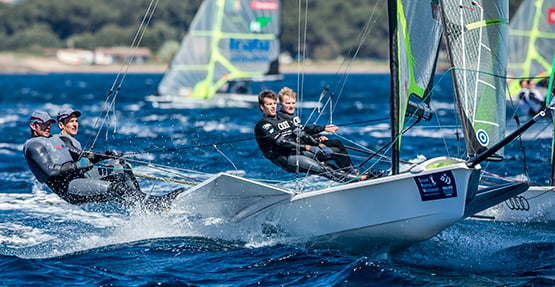 Belfast Lough's Ryan Seaton and Matt McGovern start racing in Rio on August 12
Belfast Lough's Ryan Seaton and Matt McGovern start racing in Rio on August 12
49er – Ryan Seaton & Matt McGovern
Ryan Seaton and Matthew McGovern have been steadily working their way up the world rankings this year, from 22ncd at the start of the year to 11th in the latest version. These London 2012 veterans (14th) have put in some stellar performances in recent months, most notably winning the Princesa Sofia Regatta in Palma in April.
Seaton and McGovern qualified Ireland at the first possible opportunity at the combined World Championships in Santander in 2014, finishing 8th. But their performance since has been erratic and the win in Palma was bookended by a 37th in Miami and a 28th at the 2016 Europeans. Most recently, at the international sailing week in Rio, the Belfast pair finished down the fleet, but may have been using this regatta for testing or training purposes.
There is no doubt, that on their day, Seaton and McGovern can compete with the world's best.
Men’s Skiff (49er) 20 competitors Race duration: 3 x 30 minutes daily (medal race 1 x 20 minutes) Competition days: Fri 12th/Sat 13th/Sun 14th (Reserve)/Mon 15th/Tue 16th/Wed 17th (Reserve)/Thu 18th - medal race/Fri 19th (Reserve)
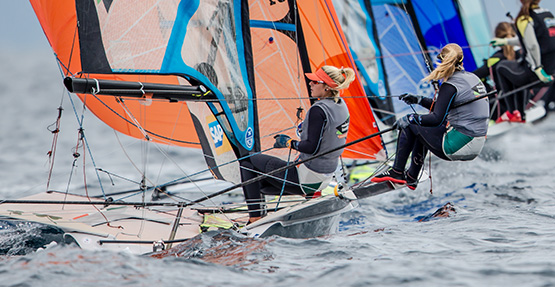 Dublin Bay's Andrea Brewster and Saskia Tidey start racing in Rio on August 12
Dublin Bay's Andrea Brewster and Saskia Tidey start racing in Rio on August 12
49erFx – Andrea Brewster & Saskia Tidey
Andrea Brewster and Saskia Tidey were the last of the Irish team to qualify, enduring heartbreak at the 2015 worlds where they were denied qualification by a protest in the final race report here. However, their performance at the Worlds was good enough to secure the next available place a few months later when no team from Africa emerged. Story here.
Brewster, a product of the British Olympic Laser radial squad, and Tidey, who transitioned from the Radial to the 49er following a season racing 18ft Skiffs in Sydney, have, until this year, hovered in the early 20s in world ranking and results at major events. 2016 has been something of a breakthrough for the Royal Irish duo, finishing in the teens more consistently, including a 12th at the European championships in Barcelona in April. A final day scoreline of 2,1,3 shows the potential that resides in this team.
Women’s Skiff (49erFX) 20 competitors Race duration: 3 x 30 minutes daily (medal race 1 x 20 minutes) Competition days: Fri 12th/Sat 13th/Sun 14th (Reserve)/Mon 15th/Tue 16th/Wed 17th (Reserve)/Thu 18th - medal race/Fri 19th (Reserve)
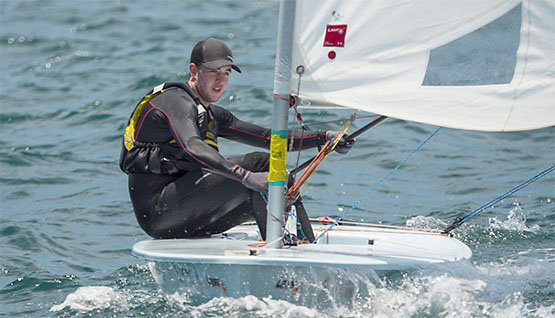 Dublin Bay's Finn Lynch starts racing in Rio on August 8
Dublin Bay's Finn Lynch starts racing in Rio on August 8
Laser – Finn Lynch
Finn Lynch's fairytale journey to Rio is recounted in Sailing on Saturdays by Winkie Nixon. However he had to overcome the 2012 Olympian James Espey, who's 38th place at the 2014 world Championship in Santander qualified the country. ISA imposed a three regatta trials system, starting with the Copa de Brasil regatta in Rio in December 2015, where Espey shaded Lynch by one place. At the next event in Palma in March and April, neither sailor made gold fleet, but Espey increased his advantage with a 53rd to Lynch's 58th. Going into the final trial, the 2016 Laser Worlds in Mexico in May, Lynch had it all to do, but a solid series of consistent results saw him qualify for the Gold Fleet, while Espey never really got off the ground until it was too late.
While Lynch, who's best results have been at under age events, is certainly not a favourite for podium in Rio, his trajectory suggests that a medal in Tokyo in 2020 is well within his capability.
Men’s One-person dinghy (Laser) 46 competitors Race duration: 2 x 50 minutes daily (medal race 1 x 25 minutes) Competition days: Mon 8th/Tue 9th/Wed 10th/Thu 11th (Reserve day)/Fri 12th/Sat 13th/Sun 14th (Reserve)/Mon 15th - medal race/Tue 16th (Reserve)
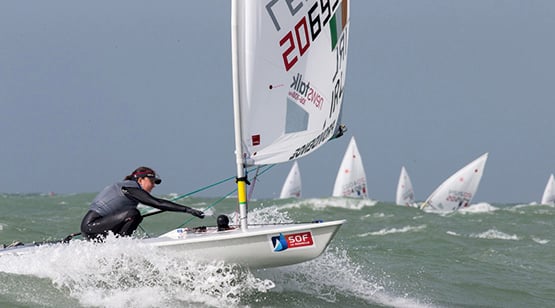 Dublin Bay's Annalise Murphy starts racing in Rio on August 8
Dublin Bay's Annalise Murphy starts racing in Rio on August 8
Laser Radial – Annalise Murphy
Currently perhaps Ireland's most famous sailor, Annalise Murphy dismissed the challenge of Aoife Hopkins in the three event trial. However, recent form contradicts her suggestion that she is one of eight in the fleet with the potential to win a medal in Rio. Since January, her results at major events have been 48th (Miami World Cup), 30th (Laser Europeans), 39th (Laser Worlds) and 34th (Weymouth World Cup). The historical profile of light and fickle winds at the Olympic venue suggests that Annalise, a heavy weather specialist, will struggle to make the medal race. The 2013 European champion has, however, surprised on many occasions before and as recently as this month scored an important win on Olympic waters in her last regatta before the Games at the Rio de Janeiro International Sailing Week. Results of that win are here.
Women’s One-person dinghy (Laser Radial) 37 competitors Race duration: 2 x 50 minutes daily (medal race 1 x 25 minutes) Competition days: Mon 8th/Tue 9th/Wed 10th/Thu 11th (Reserve day)/Fri 12th/Sat 13th/Sun 14th (Reserve)/Mon 15th - medal race/Tue 16th (Reserve)
Afloat.ie has charted the progress of the 2016 Olympic sailing team over the last four years in a dedicated Irish Olympic Sailing section



























